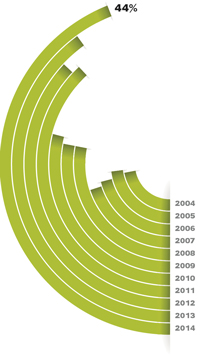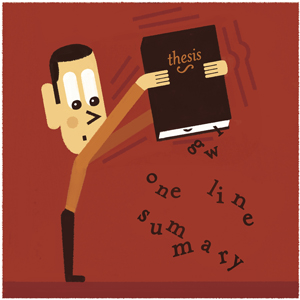New Charter Defines Role for Alumni
A new charter has been created to define the role of more than 260,000 University of Alberta alumni in the life of the university. It's a fitting step as the Alumni Association marks its centenary in 2015.
The agreement, written jointly by the Alumni Association and the university after months of collaboration, formalizes the longstanding relationship between the two. It outlines the association's "unique place within the university" and the role alumni can play to advance their alma mater.
"Alumni Council wanted to ensure that all graduates have a chance to be active participants in the life of the university," says Glenn Stowkowy, '76 BSc(ElecEng), president of the U of A Alumni Association. "Moving forward, we will have the chance, in partnership with the university, to contribute to strategy in all areas involving alumni."
The charter describes the association's mission as: "To engage university alumni and students in building the success of one of the world's great universities for the public good by positively extending the university experience beyond graduation."
Related to the new agreement, Alumni Council is expanding its membership. More graduates will be invited to play a role in council work, both in the Edmonton area and through alumni advisory boards in areas including Calgary, Vancouver, Toronto, San Francisco and Hong Kong.
"An active and engaged alumni community is essential to the future of the university," says O'Neil Outar, vice-president of advancement at the university. "The new Alumni Association charter makes a statement that the university wants and needs alumni to be a core component in the university's future."
To learn more about the charter and how you can get involved with the university, visit alumni.ualberta.ca/charter.

44% of MD grads chose family medicine
in 2014, compared with 23% in 2004
Record Number of Grads Choose Family Medicine
Close to half of the 170 medical students who graduated this spring - 44 per cent - have chosen family medicine, nearly double the percentage a decade ago.
The number of U of A grads doing residencies in family medicine in rural communities is also on the rise. Both trends are good news given a chronic shortage of doctors in rural communities.
Two U of A programs have contributed to the trend: the Preclinical Networked Medical Education program and the Integrated Community Clerkship (ICC), which has third-year medical students work with family doctors in rural communities for 41 weeks. Results show that about three of four ICC participants choose a career as a family doctor, with almost half caring for patients in rural communities.
"Students are having the opportunity to actually see what family medicine is like much earlier in their education," says Lee Green, chair of family medicine.
Devonian Botanic Garden Earns National Award
The U of A's Devonian Botanic Garden has been named Botanical Garden of the Year as part of the Canadian Garden Council's Garden Tourism Awards.
Although the 78-hectare garden is primarily a research site, about 70,000 people visit every year, including tourists, school groups and other students. The garden is a site for research, environmental education and inspiration, "but we also recognize the importance of our role as a significant tourist attraction in the Edmonton region," says Lee Foote, the garden's director.
The garden is the northernmost major botanic garden in Canada and despite the harsh Zone 3 climate, grows more than 7,000 varieties of plants.
Co2-consuming Fuel Cell Wins Spot in International Competition
Can a fuel cell consume rather than produce carbon dioxide to create energy?
That's the $10-million question a Faculty of Engineering-led team is striving to answer. The team has won a spot among 24 challengers in a competition to uncover innovative uses for carbon. The 24 projects, selected from 344 submissions representing 37 countries, receive $500,000 each in development funding over two years from the Alberta-based Climate Change and Emissions Management Corp.
Fuel cells, which produce an electric current through chemical reaction, are considered a possible alternative to internal combustion engines.
The U of A team is developing a high-temperature fuel cell technology that, through a complicated series of reactions, transforms methane, carbon dioxide and oxygen into carbon monoxide, water and energy. The idea is based on research by Thomas Etsell and Jingli Luo, professors in the U of A's Department of Chemical and Materials Engineering, and Partha Sarkar, senior scientist at Alberta Innovates - Technology Futures.
"A fuel cell is basically a continuous battery, and we're trying to develop a fuel cell that consumes fossil fuels more efficiently," Etsell says, adding the cell is "essentially turning one fuel into another."
The second round of competition is in September 2015, when five teams receive a $3-million grant each. In the final round, in 2018, one project will be awarded a $10-million grant to establish a business to reduce greenhouse gas in Alberta by one megaton annually.
- Nicole Basaraba, '09 BA
Two Honours
Two U of A-affiliated programs had reason to celebrate recently. The Faculty of Medicine & Dentistry and TEC Edmonton both received good news this spring.
The MD Program has been recognized with a full and unqualified eight-year approval following a rigorous self-examination process and close scrutiny by the governing accreditation bodies in Canada and the United States.
"The gold-plated accreditation of our medical school reflects the strength and leadership of our Faculty of Medicine & Dentistry," says President Indira Samarasekera. "The faculty's success in delivering excellence in medical education and research is a point of pride for the entire university community." The MD Program accreditation is a peer-review, quality-assurance process that measures all aspects of medical education provided to students.
TEC Edmonton was named in June as Incubator of the Year, the top honour at the 2014 Startup Canada Awards. The awards celebrate entrepreneurs, communities and organizations dedicated to supporting Canada-grown businesses. TEC Edmonton, a business incubator, is a joint venture of the U of A and the Edmonton Economic Development Corp.
Illustration Credit: Luc Melanson
Inspired by the popular blog lol my thesis, New Trail asked U of A grad students and alumni to send us a one-line summary of their thesis. Some were sincere, some whimsical, others tongue-in-cheek - but all summed up their entire thesis in one line. Here are a few of our favourites.
"The sun plays music on Earth's magnetic field."
- Laura Mazzino, PhD candidate (physics)
"Nice people used to participating within a participatory framework have a nice experience participating within a participatory framework."
- Kayla Atkey, '11 BA, MSc candidate (public health)
"An honest monk ends up locked up for life. Find the intruder."
- Silvia Sgaramella, PhD candidate (Slavic languages and literatures)
"Cracking your back may cure your pain but not everyone feels the same."
- Arnold Wong, PhD candidate (rehabilitation science)
"If you speak out, you support others to gain superpowers in reporting abuse."
- Wendy Aujla, '13 MA, PhD candidate (sociology)
"Standing tall in a windy world, yet growing strong instead of growing tall."
- Shawn Urban, '93 MSc (forest science), '04 BEd, '07 Dip(Ed)


We at New Trail welcome your comments. Robust debate and criticism are encouraged, provided it is respectful. We reserve the right to reject comments, images or links that attack ethnicity, nationality, religion, gender or sexual orientation; that include offensive language, threats, spam; are fraudulent or defamatory; infringe on copyright or trademarks; and that just generally aren’t very nice. Discussion is monitored and violation of these guidelines will result in comments being disabled.